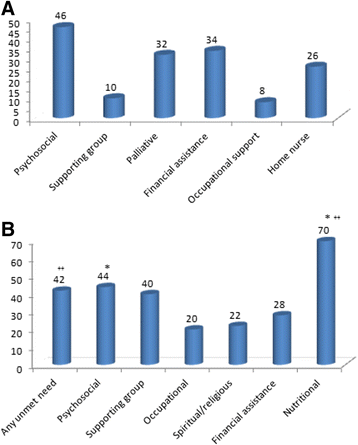Young patients and gastrointestinal (GI) tract malignancies - are we addressing the unmet needs?
- PMID: 27519697
- PMCID: PMC4983017
- DOI: 10.1186/s12885-016-2676-4
Young patients and gastrointestinal (GI) tract malignancies - are we addressing the unmet needs?
Abstract
Background: Recent epidemiological studies indicate the rate of gastrointestinal (GI) malignancies among younger patients is increasing, mainly due to colorectal cancer. There is a paucity of data regarding the magnitude of treatment-related symptoms, psychosocial issues and potential unmet needs in this population. We aimed to characterize the needs of this population to evaluate whether unmet needs could be targeted by potential intervention.
Methods: Female and male patients diagnosed with cancer of the gastrointestinal tract <40y retrospectively completed a questionnaire to evaluate symptoms, daily function and unmet needs at pre-treatment, during and post-treatment. Comparisons were made by gender, disease stage and treatment modality. Multiple linear regression models evaluated effects of demographics, symptoms and needs on multiple domains of health-related-quality-of-life (using Short-Form Health Survey-12 and CARES).
Results: Fifty patients were enrolled (52 % female) to a pilot study. Median age at diagnosis was 35.5y (range, 21-40y). The symptoms that significantly increased from baseline to during and post-treatment were: diarrhea (37 %), sleeping disorder (32 %) and sexual dysfunction (40 %). Patients also reported significant deterioration in occupational activities and coping with children compared with baseline. Female patients reported significant unmet need for nutritional counseling and psychosocial support compared to male patients (p < 0.05). Patients treated with multimodality-treatment presented higher rates of unmet needs (p = 0.03).
Conclusions: Young patients with GI cancers represent a group with unique characteristics and needs compared with published evidence on other young-onset malignancies. The distinctive symptoms and areas of treatment-related functional impairments indicate there are unmet needs, especially in the area of psychosocial support and nutritional counseling.
Keywords: Gastrointestinal (GI) cancer; Survivorship; Unmet needs.
Figures



References
-
- Surveillance Epidemiology and End Results. SEER Cancer Statistics Review, 1975- 2007, based on November 2009 SEER data submission, posted to the SEER web site, 2010. Available at: http://seer.cancer.gov/csr/1975_2007/. Accessed 30 April 2015.
-
- Blanke CD, Bot BM, Thomas DM, Bleyer A, Kohne CH, Seymour MT, de Gramont A, Goldberg RM, Sargent DJ. Impact of young age on treatment efficacy and safety in advanced colorectal cancer: a pooled analysis of patients from nine first-line phase III chemotherapy trials. J Clin Oncol. 2011;29:2781–6. doi: 10.1200/JCO.2010.33.5281. - DOI - PMC - PubMed
Publication types
MeSH terms
Grants and funding
LinkOut - more resources
Full Text Sources
Other Literature Sources

